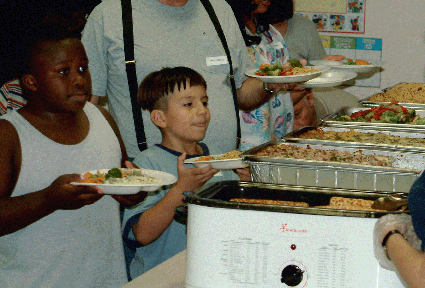A healthy helping
Horned Frogs are changing the dinner plans for a whole community — with the help of a few friends.
A healthy helping
Horned Frogs are changing the dinner plans for a whole community — with the help of a few friends.
Frances Camarillo has a new guardian angel. It’s her grandson, David Ortis, 10. David knows that sodium contributes to his grandmother’s high blood pressure, a fact he learned while participating in a multidiscipline program sponsored by TCU and several Fort Worth community agencies. Ever since, he’s been nabbing the salt shaker when Frances reaches for it.
 She laughs as David relates his salt-stealing behavior over a plate of pasta and vegetables at the Cornerstone Community Center near downtown.
She laughs as David relates his salt-stealing behavior over a plate of pasta and vegetables at the Cornerstone Community Center near downtown.
“Since I’ve been coming here, my blood pressure has gone down. So have my sugar levels,” said the Fort Worth resident, noting that as a diabetic that’s critical to her health.
“Here” is the Obesity Prevention Program, a cooperative effort involving four TCU departments — nursing, nutrition and dietetics, kinesiology and social work — as well as United Way, the Tarrant Area Food Bank and Cornerstone. And while it’s called an obesity study, in practice it focuses on teaching good nutrition and exercise habits.
More than 300 people within a select zip code participated in one or both of the 12-week programs, which began in June and concluded in November. Pat Bradley, TCU professor of nursing and lead investigator on the project, said the goal is to instill knowledge about nutrition and exercise that will help participants develop health habits that they can maintain on their own.
“We teach them that regular, mild exercise, like walking or lifting light weights, will help them maintain a healthier lifestyle,” she said. During the class, adult participants can be found doing chair exercises and lifting cans of food. Kids find that time fun as they romp on the center’s playground or dash about under a large parachute they make billow above them.
Nutrition classes offer tips on food choices, such as eating a rainbow of colors to ensure variety, as well as help in developing skills like interpreting labels and picking foods with the most essential vitamins and minerals and the least amount of bad stuff. Kids aged 6 to 12 have their own class where they learn nutritional tips such as how sugar affects your teeth and why eating fruits and vegetables helps develop strong bodies.
Camarillo said the lessons have changed the way she cooks. “I eat more fruits and vegetables and now steam my vegetables instead of frying them,” she said.
All of this learning is anchored by a hot meal prepared by students and community members hired to help. Professors watch over the menu and food preparation to insure nutritional integrity.
The research end of the project includes the participants weighing during each class and providing individual counseling to help them set goals. For several months after the classes end, a follow-up procedure determines how well the lessons have been adapted and maintained.
More than 100 members of the TCU community were involved in the two sessions, which gave students the chance to practice what they plan to do once they graduate. Augie Longoria, a senior nutrition and dietetics major, said the experience from working with the children has been invaluable.
“It has helped me learn how to be a good teacher, which is really important since I’m going to go into clinical practice,” he said. “And it’s been fun and rewarding as well. It’s only confirmed that this is what I want to do.”
While the professors note the importance of the data gathered and benefits of TCU and community groups cooperating on this project, the participants cite more practical advantages.
Fort Worth resident Bessie Pachecano had been feeling poorly earlier in the day, but once she got to the center and did her exercises, she perked right up.
“Talking to all these people who come from TCU makes me feel better,” she said.
“It’s such a blessing that they come here and help us.”

Your comments are welcome
Comments
Related Reading:
Campus News: Alma Matters
From Application to Admission
Amid an increasingly selective admission process, Heath Einstein leads the team that builds the TCU community of the future.
Campus News: Alma Matters
From the Chancellor
Chancellor Victor J. Boschini, Jr., identifies what made TCU and its sesquicentennial so memorable.